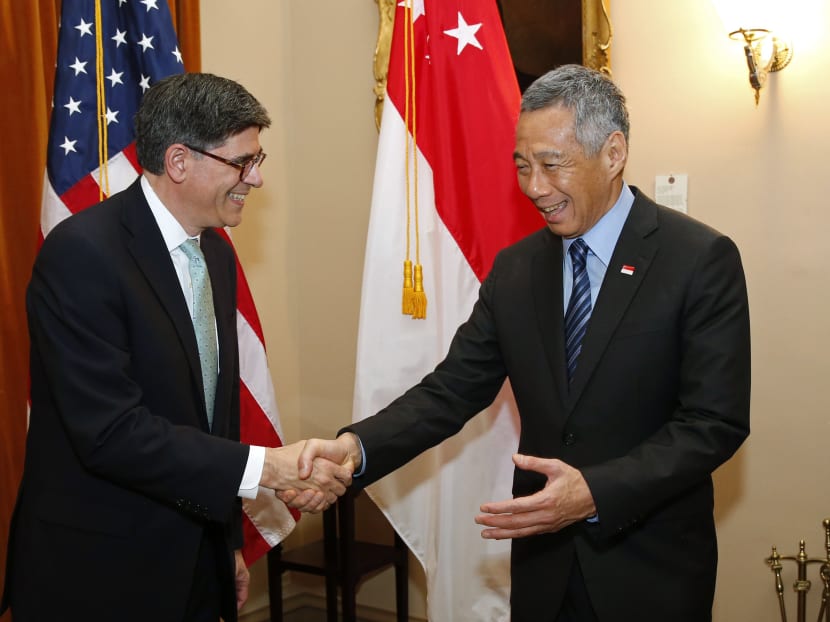PM Lee to US: Use trade policy to engage Asia-Pacific
WASHINGTON — With the end in sight for negotiations over the trade partnership that will account for one-third of world trade, Prime Minister Lee Hsien Loong yesterday called on the United States to use trade policy as a key instrument in engaging the Asia-Pacific region.

US Treasury Secretary Jack Lew (left) shakes hands with Singapore's Prime Minister Lee Hsien Loong at the Treasury Department in Washington June 23, 2014. Photo: Reuters
WASHINGTON — With the end in sight for negotiations over the trade partnership that will account for one-third of world trade, Prime Minister Lee Hsien Loong yesterday called on the United States to use trade policy as a key instrument in engaging the Asia-Pacific region.
The Trans-Pacific Partnership (TPP), which includes the US and 11 countries in the Asia-Pacific including Singapore, Australia, Japan and Chile, is “consequential” — and not only for the 40 per cent of world gross domestic product it covers, Mr Lee said at a think-tank discussion on Tuesday in Washington DC. “Consequential also because it is a signal of America’s commitment and seriousness as an Asia-Pacific power,” he said.
US President Barack Obama has talked about rebalancing towards Asia, which Singapore strongly supports. Mr Lee, who is on a six-day working visit to the US, said: “We understand that for that to be meaningful and to have substance, it cannot just be talk, it cannot just be security — which is important — but it has to be a broad engagement of the region. And you have to have policies, measures, specific projects (in) which you work with the partners in the region where it is win-win, and people say yes, America is a good and worthy friend and I am on your side.”
Mr Lee was speaking at a moderated discussion at the Council on Foreign Relations with about 145 diplomats, government officials and business leaders in the audience.
The TPP needs to be ratified after negotiations are completed, but some American news sites have noted weak support from US Democrats. Mr Lee said he hoped for support because of the TPP’s economic and strategic importance to the US, including in job creation. He acknowledged many other issues on the US agenda, such as the situation in Iraq and Syria, but hoped the US also remembers its friends and interests in Asia.
Singapore played a role in seeding the TPP: Soon after its free trade agreement (FTA) with the US came into force a decade ago, it entered into an FTA with Brunei, New Zealand and Chile, which became the starting point for the TPP.
The latest round of talks — the ninth so far — was held in the Republic last month, where the US and Japan made some progress on resolving market-access issues for their agricultural and automobile industries. Their disagreement on these issues has remained a stumbling block.
Mr Lee noted that negotiating the TPP is a complex undertaking. “Nevertheless we are almost there,” he said, adding that he hoped it would be concluded this year.
The US-Singapore FTA was celebrated on Tuesday night at a reception co-hosted by the US Chamber of Commerce and the US-ASEAN Business Council. Bilateral trade has increased by 70 per cent from 2003 to 2012, reaching US$67.9 billion (S$84.8 billion), and Singapore is the US’ largest goods and services trading partner in the Association of South-east Asian Nations (ASEAN). Mr Lee said granting Qualifying Full Bank licences to American banks — not since offered to Singapore’s other FTA partners — has allowed Citibank to expand in Singapore, and bilateral trade now includes rigs and products ranging from iPhones, Raoul shirts and Prima Taste spices.
Ms Judith Fergin, executive director of the American Chamber of Commerce in Singapore, said that because of the rigorous intellectual property protection that the FTA enshrined, American pharmaceutical and consumer products companies set up large-scale research facilities in Singapore. She added that its provisions on financial services enabled US financial institutions to partake in the expansion of Singapore’s financial markets. The FTA and the resulting increased economic engagement between the US and Singapore provide the foundation for the TPP, she noted. “The chance to include over 40 per cent of global GDP in a similarly bold, high-standard FTA is a tremendous opportunity.”
Ms Laureen Goi, general manager for sales and marketing of Singapore food manufacturer Tee Yih Jia, said via email that the US-Singapore FTA enabled the firm to pay zero import duties (from 8 per cent before) and get faster import clearance for its spring roll pastries and other products to the US. The FTA could be enhanced to allow chicken products to be exported from Singapore to the US, she suggested.
At the council dialogue, Mr Lee was asked a variety of questions, including the biggest challenges that Singapore faced. He said these included not reproducing enough, social solidarity and making a living in a world not tolerant of failure.
“We are a small country. If you turn turtle, you don’t turn back up again. That’s what we have paramount in our minds.”
On Tuesday, the Prime Minister also held meetings with Federal Reserve chair Janet Yellen and US Energy Secretary Ernest Moniz. He will attend the official launch of Temasek Holdings’ New York office today.









